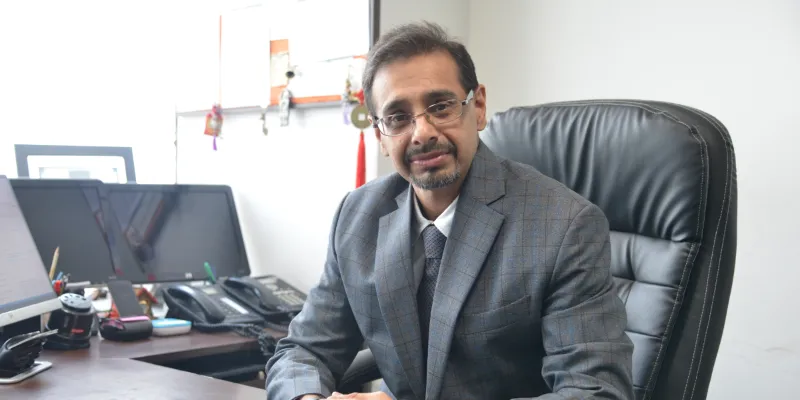This agro-warehousing company is clocking Rs 325 Cr turnover by using tech to reduce India’s post-harvest losses
SLCM was founded in 2009 by Sandeep Sabharwal. Today, it has a network of over 5,121 warehouses and 19 cold storages across India and Myanmar, spreading over 78.21 million sqft area.
Recently, at an event organised by Amazon India, Union Minister for MSME Nitin Gadkari highlighted the upliftment of agro-businesses in India. According to him, the businesses in this sector will play a crucial role in reviving the MSME sector, and subsequently, the entire Indian economy.
India has largely been an agrarian economy, yet over the years, the sector has been suffering from proper warehousing and supply chain management which leads to post-harvest loss, further pushing farmers and other stakeholders in a deeper cycle of debt and despair.

Sandeep Sabharwal, CEO, Sohan Lal Commodity Management Pvt. Ltd.
According to a report by The Associated Chambers of Commerce and Industry of India (ASSOCHAM), the post-harvest losses of fruits and vegetables in India in 2011-12 were estimated at Rs 2.13 lakh crore.
In fact, a report by the Indian Council of Agricultural Research (ICAR) stated that efforts are needed to “minimise the post-harvest losses, which will directly add to increased availability for consumption and export.”
To help reduce such losses, Pvt. Ltd. (SCLM) is providing a range of services. Founded in 2009 by Sandeep Sabharwal, the Delhi-based agro-warehousing company is a one-stop solution for the agrarian community that provides warehouse management, agriculture financing, collateral management, and procurement.
In 10 years, the company has managed to clock a turnover of Rs 325 crore.
The power of belief
Before launching SCLM, Sandeep was managing a family-owned food processing unit, where he witnessed systemic issues such as non-availability of commodities, abnormal losses during storage, bad crop protection, and unavailability of structured finance.
These difficulties compelled him to look for solutions, and thus the idea of SLCM was born. However, Sandeep took a tough decision of shutting down the food processing unit to start SLCM with an investment of Rs 16 lakh, much against his family’s wishes.
The family business, Sandeep says, was adding little value, and he knew that the business will not grow beyond a point. “My father didn’t speak to me for two years. One can face the entire world if your family is by your side, but that time was tough,” he recalls.
However, Sandeep’s determination kept him going, and soon after, his father also agreed to his business plans. In fact, in 2010, Sandeep secured Rs 10 crore from Nexus Venture Partners. Overall, SLCM has raised Rs 249 crore spread across four rounds of external funding.
Digitising the agriculture sector
Sandeep says, in this digital world, people are still trapped in traditional mindsets, hampering the speedy adoption of technology.
“People still think that the management of crops depends on the infrastructure of the warehouse. That is not true,” he adds.
Citing the examples of hotel management giants and Airbnb, the CEO says that both the companies don’t own properties, but manage them. That doesn’t make them an inferior business model. In fact, both companies have managed to scale in a short period because of a centralised management system.
The network of SLCM includes farmers, food processors, millers, traders, importers, and exporters, among others. The company attributes technology and digitisation for establishing a wide and seamless network among its stakeholders.
Currently, SLCM has a network of over 5,121 warehouses and 19 cold storages across India and Myanmar, spreading over 78.21 million sqft area.
Sandeep wanted to build technologies for the agrarian community that is sustainable, replicable, and can deal with various infrastructural issues.
“In a country like India, where post-harvest losses are pegged at 10 percent according to FICCI, devising special technology for our operations has cut post-harvest losses to 0.5 percent, irrespective of infrastructure, crop, or geographic location,” he adds.
SLCM tracks the quality and quantity of the goods stored at its warehouses in real-time through various processes and monitors the implementation of these processes through audits.
“We have deployed various technologies like SAP, Android Jelly Bean, and My SQL, among others, and have integrated all into a digital platform. Further, the platform is augmented with AI and auto ML,” he explains.
The company has also developed a standard operating procedure (SOP) called ‘AGRI REACH,’ that combines technology with agri domain expertise, and allows it to operate any warehouse agnostic to infrastructure, location, and weather pattern across any kind of agricultural crop. SLCM has applied for patents for the said technology.
Overcoming challenges
Looking back, Sandeep says it has been a “dream-like, yet a tough journey.” In the past, the company has also seen several ups and downs, including change of policies, demonetisation, and introduction of the goods and services tax (GST), among others.
Commenting on the various government policies in place for the agro-warehousing sector, Sandeep says, “Right now, the government is trying to control everything. This is a good thing from the food security point of view, but they need to draw the line somewhere.”
He believes that the Indian economy will survive and thrive in a free market ecosystem. Another challenge that besets the sector is ignorance and traditional thinking. “We are addressing food security. It is easy to educate people, but very difficult to change their beliefs,” he adds.
However, the COVID-19 pandemic has not caused much disruption in the business of SLCM as it is a digitised enterprise. In fact, it is planning to expand its operations across different geographies in ASEAN and African regions like Cambodia and Laos.
Sandeep says the company has already made investments in technology and human resources, and now plans to invest in the supply chain management vertical.
“We are prepared that some shock is going to come every six months or in a year. But, only those businesses that see these shocks as opportunities, will be able to survive,” he says.
Edited by Suman Singh










